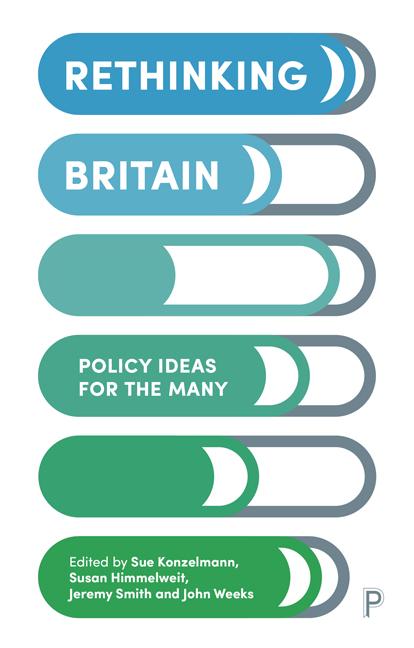Book contents
- Frontmatter
- Contents
- List of Tables and Figures
- The Contributors
- Foreword
- Introduction
- Interlude: ‘Mirror, Mirror, On the Wall – Who has the Highest Debt of All?’
- Part One Building a Full-Employment Economy: Introduction
- Part Two Public Investment – Prioritising Society Rather than Profit: Introduction
- Part Three Making Finance Work for Society: Introduction
- Part Four Genuine Social Security: Introduction
- Part Five How to provide for Social Needs: Introduction
- Conclusion
- Jargon Busters
- References and Further Reading
- Index
6 - How much would High-Quality Childcare Cost and how would we Pay for it?
Published online by Cambridge University Press: 11 March 2021
- Frontmatter
- Contents
- List of Tables and Figures
- The Contributors
- Foreword
- Introduction
- Interlude: ‘Mirror, Mirror, On the Wall – Who has the Highest Debt of All?’
- Part One Building a Full-Employment Economy: Introduction
- Part Two Public Investment – Prioritising Society Rather than Profit: Introduction
- Part Three Making Finance Work for Society: Introduction
- Part Four Genuine Social Security: Introduction
- Part Five How to provide for Social Needs: Introduction
- Conclusion
- Jargon Busters
- References and Further Reading
- Index
Summary
What's the issue?
Although few governments of industrialised countries provide universal childcare, most recognise that accessible and affordable provision of high-quality pre-school childcare is an investment in the future wellbeing of children as well as a way to increase (women’s) employment.
UK childcare policy represents the failure of state-subsidised market-based provision, with parents being charged some of the highest fees in the world and a marked socioeconomic gradient in accessibility and quality of provision. Yet, investing public money to provide universal high-quality childcare is not only beneficial socially; it also has fiscal advantages due to creating large employment effects on both the demand and supply side.
What are the real costs of providing free universal high-quality childcare, and how can it be paid for?
Analysis
The childcare system in the UK is totally inadequate. Because of the public good nature of childcare – a service whose benefits reach beyond its direct users – relying on private funding is insufficient. Unless the government pays for those additional benefits to society, no one funds them, and childcare is underprovided. This means government intervention is required to sustain childcare provision at an optimal level.
However, over the last 20 years, increased government investment in the sector – through a complex combination of cash subsidies to low-income working parents, tax breaks and direct support to providers – has failed to tackle the issues of quality, accessibility and affordability. Quality remains poor, mainly due to low pay and qualifications, despite strict staffing ratios being required.
Access is highly unequal, too. In 2009, under-three-year-olds in the 20 per cent highest-income families were six times more likely than those in the bottom 20 per cent to be in formal childcare in the UK, compared to 1.5 more likely in Germany, Belgium and Italy, and 1.2 in Denmark and Sweden. And, since then, austerity cuts have made childcare support to low-income families even less generous.
The government also funds direct subsidies to providers for the entitlement to 15 hours of free childcare (early years education) for all three-and four-year-olds (and, more recently, an additional 15 hours for those with parents in employment), with slight variations across the four nations of the UK.
- Type
- Chapter
- Information
- Rethinking BritainPolicy Ideas for the Many, pp. 206 - 210Publisher: Bristol University PressPrint publication year: 2019



